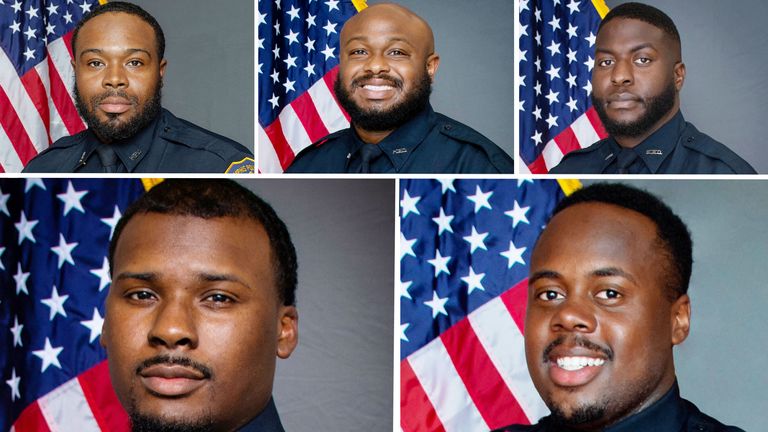Three police officers have been convicted of witness tampering in the case of Tyre Nichols, who died after a prolonged beating during a traffic stop in Memphis.
However, they were cleared of civil rights charges that could have seen them locked up for life.
Mr Nichols, a father of one, died three days after officers punched, kicked and hit him with a baton in January 2023 as he was just yards from his home.
The 29-year-old’s death and a video of the incident – in which he cried out for his mother – sparked outrage in the US and led to police reform.
One of the officers, Demetrius Haley, was found guilty on two counts of “deprivation of rights resulting in bodily injury” – each of which carries a maximum 10-year sentence.
But the federal jury decided that offence did not result in Mr Nichols’ death, ruling out a possible life sentence.
Haley was also found guilty of two counts of witness tampering; while the other two officers, Tadarrius Bean and Justin Smith, were convicted on one witness tampering count but cleared of the civil rights charges.
Two other officers had already pleaded guilty and testified against their colleagues, saying Mr Nichols had posed no threat.
All five of the men – who are all black – have been fired, and are also charged with second-degree murder in a state case, where they have pleaded not guilty. That trial has not yet begun.
Prosecutor Kathryn Gilbert told the court on Wednesday the officers tried to cover up what they did and never gave Mr Nichols any medical help.
“This wasn’t one punch. It was over and over and over and over and over again, and not one of these defendants tried to stop it,” Ms Gilbert said.
The court heard the officers had lied about the force they used – to medics treating Mr Nichols, their superviser and in written reports.
Jurors also heard they had claimed they pulled over Mr Nichols for driving dangerously, saying he had sped up to beat a red light.
Video showed them beating him for three minutes after he broke free and ran off when he was initially stopped.
A post-mortem showed he died from being hit in the head and sustained brain injuries, cuts and bruises, with haemorrhages throughout his body.
The defence tried to paint Mr Nichols as the main aggressor but one of the officers who agreed a plea deal, Emmitt Martin, testified he was not a threat and was “helpless” as they beat him.
He said the officers had understood afterwards “they weren’t going to tell on me, and I wasn’t going to tell on them”.
Desmond Mills, the other officer who took a plea deal, gave a tearful testimony saying he was sorry.
He said he participated in a cover-up hoping Mr Nichols would survive and the case would “blow over”.
Read more from Sky News:
Eminem to become a grandfather
Melania Trump speaks out on abortion rights
The US Justice Department is conducting several reviews into Memphis police, including examining its use of force, how it conducts arrests, and whether it carries out racially discriminatory policing.
Mr Nichols’ mother, RowVaughn Wells, is also suing the city and its police chief for $550m (£419m).
After Thursday’s verdict, she told reporters: “This has been a long journey for our family.
“I’m actually in shock right now because I still can’t believe all the stuff that’s going on. But we’re happy that they all have been convicted and they have been arrested.”






Leave a Reply